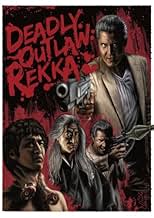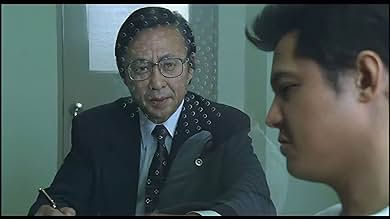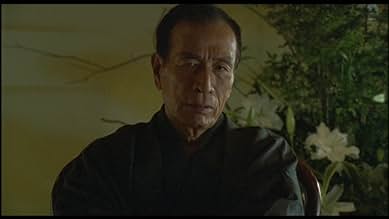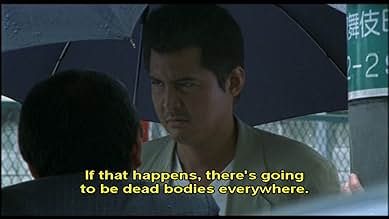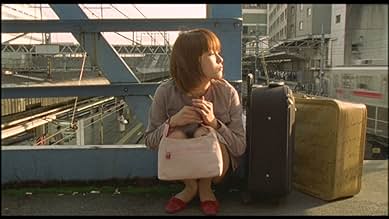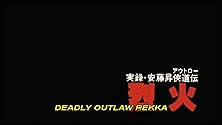Jitsuroku Andô Noboru kyôdô-den: Rekka
- 2002
- 1 घं 36 मि
IMDb रेटिंग
6.7/10
1.8 हज़ार
आपकी रेटिंग
अपनी भाषा में प्लॉट जोड़ेंWhen his beloved boss is killed, a dangerous young gangster cuts a path of vengeance through the Japanese mafia.When his beloved boss is killed, a dangerous young gangster cuts a path of vengeance through the Japanese mafia.When his beloved boss is killed, a dangerous young gangster cuts a path of vengeance through the Japanese mafia.
फ़ीचर्ड समीक्षाएं
Assassins from the Otaki group murder Yuya Uchida (manager/producer of 1970's psychedelic prog metal band Flower Travellin' Band, who provide the film's soundtrack) leader of the Sanada group. Riki Takeuchi considered him a father figure and wants vengeance, but the leaders of both groups want to avoid a war and enlist Bando group leader Sonny Chiba to negotiate a truce.
So ... it's all a scheme by both groups second-in-commands to eliminate the leaders and take over, with Chiba running the whole show. They trick Takeuchi into killing Otaki group leader Renji Ishibashi and then try to kill him to close all loose ends. Those loose ends stay very much open.
Takashi Miike has a tendency to make films that are so loose and ramshackle that they feel like they may fall apart at any minute. This is one of those. That doesn't mean they're necessarily bad ... and this one certainly isn't ... but it does mean that after a really dynamic opening and before it's amazing gonzo conclusion, you get a lot of meandering scenes of yakuza dumping plot exposition on each other. It's not always dull ... mainly due to Miike's tendency to stage very weird scenes like two yakuza talking outdoors in a playground in the rain each holding tiny transparent plastic umbrellas ... but it frequently is.
The Flower Travellin' Band soundtrack is worth the price of admission.
So ... it's all a scheme by both groups second-in-commands to eliminate the leaders and take over, with Chiba running the whole show. They trick Takeuchi into killing Otaki group leader Renji Ishibashi and then try to kill him to close all loose ends. Those loose ends stay very much open.
Takashi Miike has a tendency to make films that are so loose and ramshackle that they feel like they may fall apart at any minute. This is one of those. That doesn't mean they're necessarily bad ... and this one certainly isn't ... but it does mean that after a really dynamic opening and before it's amazing gonzo conclusion, you get a lot of meandering scenes of yakuza dumping plot exposition on each other. It's not always dull ... mainly due to Miike's tendency to stage very weird scenes like two yakuza talking outdoors in a playground in the rain each holding tiny transparent plastic umbrellas ... but it frequently is.
The Flower Travellin' Band soundtrack is worth the price of admission.
This was really one great ride from Takashi Miike, if you love or you are familliar with his style you will really enjoy Deadly Outlaw:Rekka, it is not intelligent movie, it is not movie with a big budget but it is entertraining and full of energy, and yes the cast in this one is amazing, so many great memorable faces from Japanese cinema, sadly a lot of them are now deceased: Joe Yamanaka, Rikiya Yasuoka, Yuya Uchida, Tetsuro Tanba, Shin'ichi Chiba and the main protagonist of the movie Riki Takeuchi, this is one of his most memorable roles for sure. The first half of the movie is like any other regular Yakuza movie, the second part is more unique cartoonish Miike style, and it works in the movie very well, love the ending when Riki is taking Bazooka to destroy his enemies. You will remember this movie thanks to magnificent cast and its charachters, i enjoyed this one more than more known Dead or Alive. In the same day i have watched Kikoku or Yakuza Demon from 2003, it is different sort of the movie, more regular Yakuza crime, but my recoomendation is to watch it in combination with Deadly Outlaw Rekka. I give this one 8/10.
Seemingly modeled after DEAD OR ALIVE, starting off with a stylistical hodge podge of slow-mo gunfights and paranoid posturing and sizzling in the finale with a fair share of comic-book outrageousness, Rekka succeeds as a movie not for being ultraviolent or particularly graphic (it is neither by Miike standards - although still violent enough to raise a public outcry if it was the work of a mainstream American director), not because yakuza underlings get shot full of holes or Riki Takeuchi scowls like a bulldog as he shoots rocket launchers in the middle of crowded streets (DOA homage anyone?), not for the sound and fury, but for the moments in between. In that respect, Rekka is antithetical to DOA. Whereas DOA dragged through a drab and lifeless middle act to arrive at an exciting conclusion, Rekka sustains itself through moments of quietude and intimacy. In between the outbursts of violence, Miike gives us life as lived. Takeuchi's friend giving him advice on his hair dye. The glances between Takeuchi and his Korean girlfriend. The dingy eateries, night clubs and neon-lit streets - Miike prowling Fukasaku's stampin' grounds half a century after the patriarch of the yakuza film first pictured a different kind of postwar Japan.
In the end, Rekka works so well as a movie because Miike restrains the child within him eager to shock and impress and embraces the dramatist who observes the small moments of life. The plot is mostly forgettable, something about the son of a yakuza boss going on a spree to avenge the death of his father while a gangland conspiracy festers behind and a war between the different fractions is about to break out, and Takeuchi in the leading role scowls a little too much for my liking. But overall, this is as good a yakuza flick as I've seen from Miike, violent, funny, occasionally beautiful, imaginatively conceived but hastily executed (as with most Miike films), a thoroughbred Miike flick bearing all his trademarks, one aimed at both the heart and the gut. Not a masterpiece of any kind but a worthwhile movie.
In the end, Rekka works so well as a movie because Miike restrains the child within him eager to shock and impress and embraces the dramatist who observes the small moments of life. The plot is mostly forgettable, something about the son of a yakuza boss going on a spree to avenge the death of his father while a gangland conspiracy festers behind and a war between the different fractions is about to break out, and Takeuchi in the leading role scowls a little too much for my liking. But overall, this is as good a yakuza flick as I've seen from Miike, violent, funny, occasionally beautiful, imaginatively conceived but hastily executed (as with most Miike films), a thoroughbred Miike flick bearing all his trademarks, one aimed at both the heart and the gut. Not a masterpiece of any kind but a worthwhile movie.
Rekka is a movie that deals with the theme of backstabbing and diplomacy of the new Yakuza clashing against the violence and honor of the old Yakuza; a common theme in Miike's under-the-radar gangster movies. It begins when the protagonist's father, the leader of a crime family, is killed. Before he knows what's happening, the new boss of his gang is already making agreements and accepting the murder to avoid a full-scale gang war. Needless to say, the son isn't happy, so he seeks revenge on the rival crime family. Knowing this, the new boss tries to get rid of him so that he can enjoy his new place in the Yakuza hierarchy.
On its own, this is an exciting modern Yakuza thriller filled with bloodshed and intrigue. But if you're already a Miike fan, you might be let down by a few details.
Rekka follows a pretty distinct formula. It has the same plot ideas, nearly the same characters, some of the same actors, and the same filmmakers as Agitator and Kikoku (which came out later). While Miike changes up the style and feel of each one, it still looks like he made three different versions of the same movie. Shigenori Takechi, the screenwriter of all three, has to be the laziest guy in the film industry. You see the same characters doing the same things, only with different names and settings. Like the other movies, the protagonist is a seemingly invincible and honorable guy who just can't seem to get killed no matter what he does. There is a charismatic and equally invincible hit-man chasing him. There are greedy and cowardly superiors that only he can stand up to. There is a dethroned and deceased father figure that he wants to avenge. And of course, there is a love interest that appears for a few minutes combined and has no personality or reason to even be in this movie.
The way that this movie is different is that the feel is a little more intense and modern than the other two. The visuals and camera-work are comparatively better and do a much better job of grabbing your attention. It is not as slow-paced and complicated as Agitator (clearly the best of the three), and it's all-around better than Kikoku (the worst). The ending is the most unique part. For better or worse, it is incredibly strange, and I know that some people will like it. Rekka appears to have the largest budget of the three movie and is the easiest to understand; it's definitely the one to show to your friends.
Like those two other movies, there are no insane shocker moments or incredible gore effects that will stick in your head forever. Rekka has almost nothing in common with Ichi or Fudoh, for example, so new fans of Miike's work might not get what they expect. But it has more than its share of violence, just not enough to make your head spin.
On it's own, Rekka is definitely not a waste of time, and my criticism doesn't sound fair at all. However, the feeling is ruined when you've seen Agitator and/or Kikoku. Seeing these movies after each other in a short span of time left me with a feeling that I got from Graveyard of Honor, another Miike/Takechi product. But in that case, it only took one movie to make me feel uncomfortable by giving me the same message over and over again.
On its own, this is an exciting modern Yakuza thriller filled with bloodshed and intrigue. But if you're already a Miike fan, you might be let down by a few details.
Rekka follows a pretty distinct formula. It has the same plot ideas, nearly the same characters, some of the same actors, and the same filmmakers as Agitator and Kikoku (which came out later). While Miike changes up the style and feel of each one, it still looks like he made three different versions of the same movie. Shigenori Takechi, the screenwriter of all three, has to be the laziest guy in the film industry. You see the same characters doing the same things, only with different names and settings. Like the other movies, the protagonist is a seemingly invincible and honorable guy who just can't seem to get killed no matter what he does. There is a charismatic and equally invincible hit-man chasing him. There are greedy and cowardly superiors that only he can stand up to. There is a dethroned and deceased father figure that he wants to avenge. And of course, there is a love interest that appears for a few minutes combined and has no personality or reason to even be in this movie.
The way that this movie is different is that the feel is a little more intense and modern than the other two. The visuals and camera-work are comparatively better and do a much better job of grabbing your attention. It is not as slow-paced and complicated as Agitator (clearly the best of the three), and it's all-around better than Kikoku (the worst). The ending is the most unique part. For better or worse, it is incredibly strange, and I know that some people will like it. Rekka appears to have the largest budget of the three movie and is the easiest to understand; it's definitely the one to show to your friends.
Like those two other movies, there are no insane shocker moments or incredible gore effects that will stick in your head forever. Rekka has almost nothing in common with Ichi or Fudoh, for example, so new fans of Miike's work might not get what they expect. But it has more than its share of violence, just not enough to make your head spin.
On it's own, Rekka is definitely not a waste of time, and my criticism doesn't sound fair at all. However, the feeling is ruined when you've seen Agitator and/or Kikoku. Seeing these movies after each other in a short span of time left me with a feeling that I got from Graveyard of Honor, another Miike/Takechi product. But in that case, it only took one movie to make me feel uncomfortable by giving me the same message over and over again.
excerpt, more at my location - A yakuza film is bread and butter for Takashi Miike, and Deadly Outlaw: Rekka (Jitsuroku Andô Noboru kyôdô-den: Rekka), sandwiched between the sadistic violence of Ichi The Killer and the surrealism of Gozu, is surprisingly ordinary when compared with much of the director's oeuvre. However, the straightforward nature of this 2002 film is the essence of its charm.
Deadly Outlaw: Rekka is such unabashed fun it will leave you feeling indulgent and sporting a maniacal grin from start to finish, just like the one, you might imagine subsequent to viewing, Miike wore while making it. Concentrated to an hour-and-a-half, as so few recent films are, it hits you like a shot of pure audio-visual entertainment straight in the arm.
Deadly Outlaw: Rekka is such unabashed fun it will leave you feeling indulgent and sporting a maniacal grin from start to finish, just like the one, you might imagine subsequent to viewing, Miike wore while making it. Concentrated to an hour-and-a-half, as so few recent films are, it hits you like a shot of pure audio-visual entertainment straight in the arm.
क्या आपको पता है
- ट्रिवियाTakashi Miike cut this movie to the strains of the 1971 progressive rock album "Satori" by the Flower Traveling Band, which he learned of through costars Joe Yamanaka and Yûya Uchida, who were also the band's founding members. Miike found the album to be way ahead of its time and was delighted at how well and inconspicuously it cut into a movie made 30 years later.
- गूफ़At 35:52 the shadow of someone holding a hand-held camera can be seen.
- कनेक्शनReferenced in Rewind This! (2013)
टॉप पसंद
रेटिंग देने के लिए साइन-इन करें और वैयक्तिकृत सुझावों के लिए वॉचलिस्ट करें
विवरण
- रिलीज़ की तारीख़
- कंट्री ऑफ़ ओरिजिन
- आधिकारिक साइट
- भाषा
- इस रूप में भी जाना जाता है
- Deadly Outlaw: Rekka
- उत्पादन कंपनी
- IMDbPro पर और कंपनी क्रेडिट देखें
- चलने की अवधि1 घंटा 36 मिनट
- रंग
इस पेज में योगदान दें
किसी बदलाव का सुझाव दें या अनुपलब्ध कॉन्टेंट जोड़ें

टॉप गैप
What is the Spanish language plot outline for Jitsuroku Andô Noboru kyôdô-den: Rekka (2002)?
जवाब
